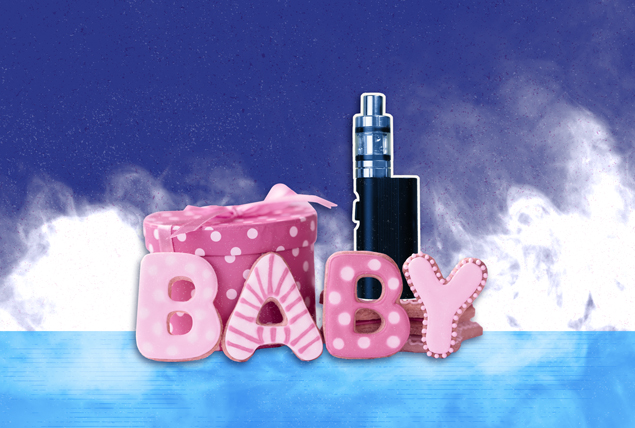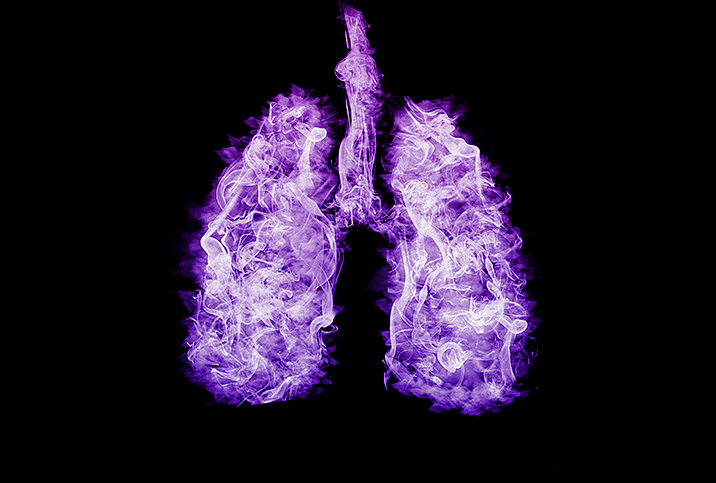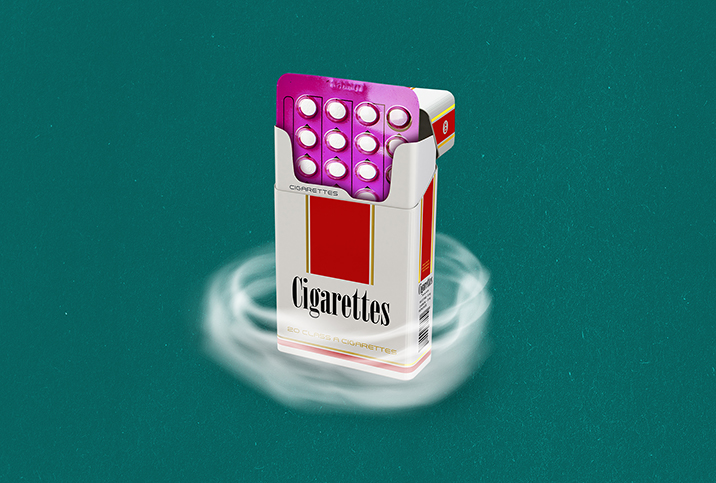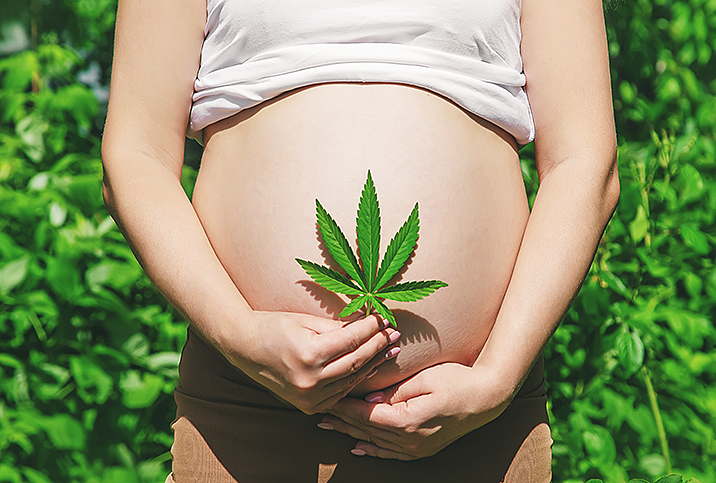Is Vaping During Pregnancy as Bad as Smoking Cigarettes?

Key Points
- Many people think vaping during pregnancy is safer than smoking cigarettes. They'd be wrong.
- Although vape liquid doesn't have some of the same toxic chemicals as tobacco cigarettes, vaping can still pose significant health risks for expectant parents and their babies.
- If you vape while pregnant, take precautions to help minimize health risks to your baby.
One of the most important and well-known facts about pregnancy is that smoking while pregnant is incredibly dangerous. For expectant parents, it may increase the risk of serious issues such as high blood pressure, stroke and heart attack.
Vaping can jeopardize a baby's health and development and increase the chances of congenital disabilities, miscarriage and stillbirth. Some people believe vaping is a safer alternative to tobacco, but that may not be the case, according to recent research.
Will vaping harm my baby?
Vaping may be just as dangerous as traditional cigarettes for developing fetuses and may adversely affect bone and lung development, according to a 2023 study published in Developmental Biology.
Previous studies suggest smoking e-cigarettes could have additional adverse side effects, particularly if the vape product contains nicotine.
Nicotine crosses the placenta and can have harmful effects on babies' developing brains, lungs and hearts, said Madeline Stark, M.D., an OB-GYN at Rush University Medical Center in Chicago.
These effects can have lifelong consequences for the child. Nicotine constricts the blood vessels that feed the placenta and limits the amount of blood the baby receives. This can lead to miscarriage, fetal growth restriction, low birth weight, placental abruption and stillbirth.
Other contaminants in vape liquid—carbon monoxide is a big one—are also harmful and can diminish fetal oxygen levels, Stark said.
Is vaping bad during pregnancy?
Like traditional cigarettes, e-cigarettes pose many health risks, said Ila Dayananda, M.D., M.P.H., a New York City-based OB-GYN and the chief medical officer at Oula Health.
Again, the risks are particularly prevalent when a vape product contains liquid nicotine. Besides jeopardizing your baby's health, nicotine can raise your blood pressure and adrenaline levels, increasing the risk of heart attack, according to Johns Hopkins Medicine.
Even vape products without nicotine can cause lung damage, according to the Centers for Disease Control and Prevention (CDC).
Vaping during early pregnancy
If you were vaping during early pregnancy without knowing you were pregnant, it's uncertain what the effects may be. Quit vaping as soon as you learn you are expecting.
"The earlier in pregnancy you quit, the better the outcomes," Stark said. "Some data even suggests that if you quit by the second trimester, outcomes are similar to those who didn't smoke or vape at all. The best outcomes are for those who quit by 15 weeks into their pregnancy."
Vaping during late pregnancy
The effects of vaping and other toxic exposures over time are likely dose-dependent, said Sarah Twogood, M.D., an OB-GYN at Cedars-Sinai Medical Group in Los Angeles and board medical advisor for the women's health app Flo.
That means the longer and more frequently you vape during the pregnancy, the more likely it is to harm you or your baby.
Recommended
- New Research Shows Cannabis Use Is on the Rise Among Pregnant People: Cannabis use among pregnant women has surged since 2022, but is it safe?
- Walks in Nature Could Help Prevent Postpartum Depression: Exercise and spending time in nature are two science-backed ways to de-stress and improve overall mental health.
- How Delicate Are You Really During Pregnancy?: Most pregnant people aren't as fragile as some people think, but it's still important to be cautious.
Can vaping cause miscarriage?
Miscarriages are common, and vaping may increase the risk, Twogood said.
Smoking and nicotine use have been linked to miscarriage, likely due to the decrease in oxygen, fetal developmental anomalies and decreased blood flow to the early-developing placenta, according to Stark.
Other toxins in e-cigarettes can cross the placenta and potentially cause harmful side effects, Twogood said.
"One of these toxins in particular, called cotinine, can stimulate the uterus to contract, which may increase the risk of miscarriage," she added.
Is secondhand vape smoke during pregnancy bad?
There's a misunderstanding that vaping doesn't produce secondhand smoke.
When someone vapes, they can exhale aerosols containing nicotine and other toxic fine and ultrafine particles that circulate in the air, Twogood said.
There is newer evidence suggesting nicotine and other toxins from e-cigarettes can deposit on surfaces and lead to "thirdhand" exposure, Stark said.
Although vape liquids contain higher concentrations of ultrafine particles than traditional cigarettes, their secondhand smoke may not be as toxic, according to a small 2019 study.
Secondhand smoke of either kind can be harmful since inhaled chemicals enter your bloodstream and pass through the placenta. Vaping around babies is similarly dangerous and can predispose children to various acute and chronic health conditions.
Some conditions associated with second- and thirdhand smoke exposure include miscarriage, low birth weight, premature birth, sudden infant death syndrome (SIDS), and learning or behavioral challenges, according to the American Pregnancy Association (APA).
Is vaping weed bad during pregnancy?
There's not much scientific research on smoking weed while pregnant, according to Dayananda.
However, one of the two primary compounds in weed, THC (tetrahydrocannabinol), crosses the placenta and may adversely affect brain and nervous system development, regardless of how it's ingested, Dayananada added.
THC may make the fetus more susceptible to the adverse effects of other substances, such as alcohol, tobacco or illicit drugs, Stark said.
Data suggests exposure to marijuana in pregnancy may increase the risk of stillbirth. Pregnant people who use weed more than once a week have a greater chance of poor fetal growth, low birth weight and preterm delivery.
Marijuana exposure in utero also, according to Stark, is associated with factors such as:
- Lower scores on tests of visual problem-solving
- Impaired visual-motor coordination
- Decreased attention span
- Increased behavioral problems by age 14
People who are breastfeeding can transmit THC to their babies, which may affect healthy development, Dyananda said.
Is nicotine-free vaping safe during pregnancy?
Liquid nicotine is just one of many toxic ingredients in e-cigarettes, along with hard metals, carbon monoxide, carcinogens and even antifreeze, Twogood and Stark said. They might be less hazardous, but nicotine-free products aren't safe.
"Nicotine can result in addictive behavior and increased vaping, so theoretically, nicotine-free vaping would be a better choice," Stark said. "However, the health risks of vaping are still similar."
Is a vape worse than a cigarette when you're pregnant?
There's limited data comparing the effects of traditional and electronic cigarettes in pregnant people, but neither is safe, Twogood said.
There's no difference between vape nicotine versus cigarette nicotine; nicotine in any form can be harmful, Stark said. However, some evidence suggests the levels of nicotine in a mother's blood may be lower when using e-cigarettes, according to La Leche League Canada.
Some chemicals and substances in regular cigarettes are not in vapes, but the latter contain different chemicals and toxins that can harm babies, Twogood said.
How can you quit vaping during pregnancy?
Going cold turkey is usually the most effective way to quit smoking, a 2017 report indicated. However, if that seems overwhelming, reducing your intake is still beneficial.
Nicotine replacement therapy (NRT) is one way to manage withdrawals. Though it isn't risk-free, it may be safer than smoking, according to a 2021 systematic review.
Some forms of NRT, such as gum, lozenges and sprays, may be safer for pregnant people than others, such as patches, according to a 2022 study. Researchers believe that fast-acting NRT products may limit nicotine exposure to the fetus.
Some forms of nicotine replacement therapy may be safer than some prescription nicotine cessation medications, such as bupropion.
The American Academy of Pediatrics doesn't recommend tablets such as Zyban or Chantix.
Talk to your healthcare provider before trying NRT to ensure it's the right choice for you.
Other tips to stop vaping include the following:
- If anyone in your household vapes or smokes, ask them to quit with you.
- Remove vaping paraphernalia such as pens and liquids from your household and car.
- Find things to do instead of vaping, such as drinking water or tea, going for a short walk, journaling or chewing gum.
- Try alternative treatments such as hypnotherapy, acupuncture or mindfulness meditation.
- Work with a smoking and vaping cessation counselor.
- Seek support from outside groups and resources such as Smokefree.gov.
Does vaping affect breast milk?
Studies have found nicotine and other toxins from e-cigarettes in breast milk.
"There's no data about long-term outcomes in these babies, but it certainly poses a potential threat to their health," Twogood said.
Nicotine in breast milk may impede infants' sleep patterns and put them at risk of blood sugar and thyroid issues, a 2008 study suggested.
Nicotine decreases the milk supply by lowering the levels of the hormone prolactin, which stimulates breast milk production, Stark said.
Can you vape while breastfeeding?
"It's not recommended to smoke or vape while breastfeeding because many toxins that get into the body while smoking or vaping cross into the breast milk that the baby ingests," Twogood said, adding that secondhand and thirdhand smoke may also harm the baby.
If you decide to vape while breastfeeding, consider the following tips from La Leche League Canada and the CDC:
- Smoke immediately after breastfeeding, not before.
- Smoke less or try to quit.
- Don't smoke in the house or car.
- Smoke outside.
- Change your clothes before breastfeeding or touching your baby.
- Wash your hands after smoking and before handling your infant.
How long after vaping can I breastfeed?
Breastfeeding provides various health benefits for infants, so it's essential to do so if you can, even if you continue to vape, according to the CDC.
La Leche League Canada recommends waiting at least two to three hours between smoking and breastfeeding to limit the baby's exposure to potentially harmful chemicals.
How long does nicotine stay in breast milk?
"Everyone's a little different in how long nicotine lasts in their system and their breast milk, but it is estimated that about an hour and a half after smoking, the nicotine levels in breast milk will have dropped by about half," Stark said.
It may take upwards of 10 to 12 hours for all active nicotine chemicals to clear from breast milk, Twogood said. For other toxins, including heavy metals, it takes much longer.
The bottom line
If e-cigarettes seem like a safer alternative to smoking traditional cigarettes, think again. They may not be any safer for you or your baby and e-cigarettes should not be used to quit the real thing, Twogood said.
"There are a lot of safe options in pregnancy to help patients with their nicotine addiction and to permanently quit smoking, and patients should feel empowered by their strength as a mother to reach out for help in quitting, for both themselves and their children," Stark said.
Talk to your healthcare provider about quitting smoking and staying healthy while pregnant.


















